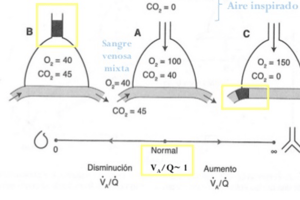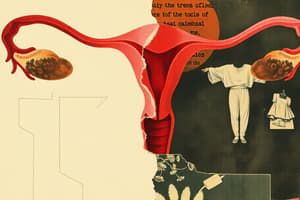Podcast
Questions and Answers
Tracking menstrual cycle and avoiding sex when most fertile is a method of ______
Tracking menstrual cycle and avoiding sex when most fertile is a method of ______
abstinence
Oestrogen inhibits the production of ______
Oestrogen inhibits the production of ______
FSH
The contraceptive pill contains ______ and progesterone
The contraceptive pill contains ______ and progesterone
oestrogen
The ______ only has one hormone, progesterone
The ______ only has one hormone, progesterone
The contraceptive patch lasts for ______ and contains oestrogen and progesterone
The contraceptive patch lasts for ______ and contains oestrogen and progesterone
Contraceptive injections need to be redone every ______ months
Contraceptive injections need to be redone every ______ months
The implant provides ______ progesterone and lasts for ______ years
The implant provides ______ progesterone and lasts for ______ years
The copper IUD reduces fertility by ______ sperm from surviving
The copper IUD reduces fertility by ______ sperm from surviving
Ovaries produce ______ which is used in the menstrual cycle.
Ovaries produce ______ which is used in the menstrual cycle.
The ______ hormone triggers ovulation in females.
The ______ hormone triggers ovulation in females.
The ______ gland produces FSH and LH.
The ______ gland produces FSH and LH.
The ______ hormone maintains the uterus lining in the second half of the cycle.
The ______ hormone maintains the uterus lining in the second half of the cycle.
The ______ method of avoiding pregnancy includes tracking ovulation and avoiding intercourse.
The ______ method of avoiding pregnancy includes tracking ovulation and avoiding intercourse.
The ______ cycle consists of four stages.
The ______ cycle consists of four stages.
The ______ hormone stimulates the production of testosterone in males.
The ______ hormone stimulates the production of testosterone in males.
The process of ______ involves cutting or tying fallopian tubes or sperm duct.
The process of ______ involves cutting or tying fallopian tubes or sperm duct.
Flashcards are hidden until you start studying
Study Notes
Hormones in the Menstrual Cycle
- Ovaries produce estrogen and progesterone.
- Luteinizing hormone (LH) and follicle-stimulating hormone (FSH) are produced by the pituitary gland.
Menstrual Cycle Phases
- The menstrual cycle has four stages.
- Stage 1: Uterus lining breaks down (4 days).
- Stage 2: Uterus lining builds up again (10 days).
- Stage 3: Egg develops and is released (ovulation) on day 14.
- Stage 4: Uterus lining is maintained, and if no fertilized egg is present, lining breaks down again (14 days).
Hormone Functions
- FSH causes eggs to mature in follicles and stimulates estrogen production.
- LH stimulates testosterone production in males and triggers ovulation in females.
- Estrogen makes the uterus lining grow and stimulates LH release, which releases FSH.
- Progesterone maintains uterus lining in the second half of the cycle and inhibits LH and FSH release.
Contraception Methods
- Sterilization involves cutting or tying fallopian tubes or sperm ducts and is almost completely permanent.
- Natural method: tracking menstrual cycle and avoiding sex during fertile periods.
- Abstinence: not having sex.
Contraceptive Pills
- Two types of pills: estrogen and progesterone, and progesterone-only.
- Estrogen and progesterone prevent eggs from being released.
- Pills are 99% effective, but do not prevent STIs.
- Negatives of pills: side effects, no STI prevention.
Other Contraceptive Methods
- Contraceptive patch: lasts one week, contains estrogen and progesterone.
- Contraceptive injection: lasts 2-3 months, contains progesterone.
- Contraceptive implant: lasts 3 years, provides continuous progesterone, and stops ovaries from releasing eggs.
Intrauterine Devices (IUDs)
- IUDs come in copper and plastic types, last 3-10 years, and are T-shaped.
- Copper IUD prevents sperm survival, while plastic IUD releases progesterone.
Barrier Methods
- Condoms and diaphragms are barrier methods.
- Diaphragm: a plastic cup placed over the cervix, usually paired with a spermicide.
- Spermicides are 70-80% effective.
Fertility Drugs
- Contain FSH and LH hormones.
- Stimulate egg development and release.
Studying That Suits You
Use AI to generate personalized quizzes and flashcards to suit your learning preferences.




